- Home
- Jayne Anne Phillips
Fast Lanes Page 14
Fast Lanes Read online
Page 14
This was perhaps twenty minutes of a night in July, 1900. I looked at Warwick as though for the first time. When he talked he was so close I could feel the words on my skin distinct from night breeze. “Are you glad you saw?” he whispered, his face frightened.
He had been watching them from the tree for several weeks.
“Warwick. Warwick, are you here?”
Thick wide door of the barn shuts behind me; inside it is darker than morning in the field, where the light seems nearly ivory, indirect and still diffuse, early. Inside, the barn is a color nearly olive, furred with warmth and the smells of animals close all night. Coolness come finally just at dawn is only barely felt. Morning, early morning, as the Independence Day parade begins at noon in Coalton and we have both horses to curry and brush.
“Warwick, you have the ribbon? I brought the satin but the rest was gone from the sewing box.”
He says, “I have the grosgrain, there, in the basket.”
Now I hear Mags and Race, snorting in the far stalls at the end and Warwick is there. I don’t see the combs, the silver shine in his hands, but hear their teeth on the horses’ long necks and see Warwick. Both arms moving smooth and repetitive as in some purposeful dance except all his body is still, just standing, while his arms stay lifted, stroking. He watches his hands, the combs, and the horses whinny because I’m closer and they smell apples.
“Ava is making the carriage streamers,” I tell him.
The apples are in my apron and I reach for them, not looking; they’re hard and small and sweet; the horses jostle and lower their long heads to mouth my palm with their velvety lips that leave no wetness. There is the sound of the apples cracking and the big breathing of horses. Warwick steps back. There are the combs in his palms, their leather straps across the backs of his hands.
“Are the rest of them awake?” he asks.
“Yes, up cooking food for the picnic. Where did you sleep?”
“Out here.”
He touches my shoulder with the side of his wrist and his face is still in half-shadow. While he talks my eyes get used to the dimness and I see his mouth, the line of his jaw. He has a thin, narrow face that is sensitive and changing; already he is a head taller than me.
“You didn’t mean to watch them,” he says. “I led you into it. You won’t tell anyone?”
“No. But if you watch them again I don’t want to know.”
“I won’t watch them. Here, take the grosgrain first. You do Mags.”
He puts the combs down where they glint in straw and we prop the basket of ribbons between us, against the stall. The horses stand very still, almost somnolent, while we touch them. Our fingers in their long manes are plaiting the rough hair, the hair coarse and cool and dead against the warmth of their broad necks. In the quiet the horses feel big and human, their hard heads pressed close our shoulders.
“You remember when Claude got married?” Warwick says.
His hands are faster; he knots the red grosgrain into each plait and crosses thin ribbons, red, blue, down each length to keep the braids tight. Mags and Race stay still, only shifting their weight, moving their hindquarters to stand where the straw is thicker.
“I remember, we all went down to Bluefield on the train. Was it two years ago?”
“She was in a family way. Then, at the wedding.”
“How would you know?”
“Claude told me. He said she was, and he had made it right to her and did not regret it. She lost that baby early on and felt badly, like he had married her now for no reason—but Claude said he would have anyway, got married, because he was her first.”
“Her first?”
“Yes, he knew he was. He was her first and a woman belongs to that man, whether she is with him later or not.”
“I don’t believe you, Warwick. What about the Jones girl, the one hurt last spring by that tramp?”
He touches Race under her mane, pulls a lock of the coarse hair straight.
“Well?” I ask him.
“The tramp was lynched, wasn’t he? If the girl had been a tramp herself, the man would have been let go or jailed. But she was young and her father dead and her brothers not grown, so the townsmen met in Coalton and found the man.”
“But the tramp can’t own her when he’s dead. Who owns her then?”
Warwick is still a moment in the shady light, his hands moving, and between us the basket is nearly empty. The straw bottom looks white in this dimness.
“I don’t know,” he says. “I guess then she’s a kind of orphan.”
The satin ribbon is knotted in a coil beneath grosgrain, slick and silky by the nubby darker red—unrolling it I feel the basket shift and almost fall. Warwick catches it, kneeling down beside me to hold it with one hand.
“But a woman does belong to her first man and that is the truth,” he says.
“I think it’s a lie.”
“How do you mean?”
“I know, I know it is.”
“How can you know?”
“I feel it, I’m certain.”
“You feel it because you don’t know.”
In old photographs of Coalton that July 4th, the town looks scruffy and blurred. The blue of the sky is not shown in those black-and-white studies, nor the colors of the streamered buildings and the flags, the finery worn by the crowd. Wooden sidewalks on the two main streets were broad and raised; that day people sat along them as on low benches, their feet in the dusty road, waiting for the parade. We were all asked to stay still as a photographer took pictures of the whole scene from a near hillside. People did sit quite still, or stand in place, some of them in windows of the old hotel; then there was a prayer blessing the new century and the cornet band assembled. The parade was forming out of sight, by the river, and most townspeople driving decorated carriages had already driven out—Warwick had gone, with Claude and Pa, and some of the young cousins. It would be a big parade; we had word that local merchants had hired part of a circus traveling through Bellington. I ran up the hill to see if I could get a glimpse of them; Mam was calling me to come back and my shoes were blond to the ankles with dust. Below me the crowd began to cheer. The ribboned horses danced with fright and kicked, jerking reins looped over low branches of trees and shivering the leaves. From up the hill I saw dust raised in the woods and heard the crackling of what was crushed. There were five elephants; they came out from the trees along the road and the trainer sat on the massive harnessed head of the first. He sat in a sort of purple chair, swaying side to side with the lumbering swivel of the head. The trainer wore a red cap and jacket; he was dark and smooth on his face and held a boy close his waist. The boy was moving his arms at me and it was Warwick; I was running closer and the trainer beat with his staff on the shoulders of the elephant while the animal’s snaky trunk, all alive, ripped small bushes. Warwick waved; I could see him and ran, dodging the men until I was alongside. The earth was pounding and the animal was big like a breathing wall, its rough side crusted with dirt and straw. The skin hung loose, draped on the limbs like sacking crossed with many creases. Far, far up, I saw Warwick’s face; I was yelling, yelling for them to stop, stop and take me up, but they kept on going. As the elephants passed, dust lifted, and ribbons and hats, the white of the summer skirts swung and billowed. The cheering was a great noise under the trees and birds flew up wild. Coalton was a sea of yellow dust, the flags snapping in that wind and banners strung between the buildings broken, flying.
• • •
Warwick got it in his head to walk a wire and none could dissuade him. Our Pa would not hear of such foolishness so Warwick took out secretly to the creek every morning and practiced on the sly. He constructed a thickness of barn boards lengthwise on the ground, propped with nailed supports so he could walk along an edge. First three boards, then two, then one. He walked barefoot tensing his long toes and cradled a bamboo fishing pole in his arms for balance. I followed along silently when I saw him light out for the woods. Standing back a hundred feet fr
om the creek bed, I saw through dense summer leaves my brother totter magically just above the groundline; thick ivy concealed the edges of the boards and made him appear a jerky magician. He often walked naked since the heat was fierce and his trousers too-large hand-me-downs that obstructed careful movement. He walked parallel to the creek and slipped often. Periodically he grew frustrated and jumped cursing into the muddy water. Creek bottom at that spot was soft mud and the water perhaps five feet deep; he floated belly-up like a seal and then crawled up the bank mud-streaked to start again. I stood in the leaves. He was tall and still coltish then, dark from the sun on most of his body, long-muscled; his legs looked firm and strong and a bit too long for him, his buttocks were tight and white. It was not his nakedness that moved me to stay hidden, barely breathing lest he hear the snap of a twig and discover me—it was the way he touched the long yellow pole, first holding it close, then opening his arms gently as the pole rolled across his flat still wrists to his hands; another movement, higher, and the pole balanced like a visible thin line on the tips of his fingers. It vibrated as though quivering with a sound. Then he clasped it lightly and the pole turned horizontally with a half-rotation; six, seven, eight quick flashes, turning hard and quick, whistle of air, snap of the light wood against his palms. Now the pole lifted, airborne a split second and suddenly standing, earthward end walking Warwick’s palm. He moved, watching the sky and a wavering six feet of yellow needle. The earth stopped in just that moment, the trees still, Warwick moving, and then as the pole toppled in a smooth arc to water he followed in a sideways dive. While he was under, out of earshot and rapturous in the olive water, I ran quick and silent back to the house, through forest and vines to the clearing, the meadow, the fenced boundaries of the high-grown yard and the house, the barn, where it was shady and cool and I could sit in the mow to remember his face and the yellow pole come to life. You had to look straight into the sun to see its airborne end and the sun was a blind white burn the pole could touch. Like Warwick was prodding the sun in secret, his whole body a prayer partly evil.
That night I saw our mother hold his feet in her lap. She ran the cold edge of her steel darning needle up and down, up and down his flesh, taking painlessly the splinters from his skin. I stood with a lamp, hidden from sight at the porch door; beyond the filtered light of the globe close my face I saw my brother, my mother, two lumps in pale garments, moving, and past them the foreshortened planks of porch floor shaded a graduated dark. The round porch pillars were lost at one fat end in eaves. Low grass of the yard rumpled like carpet to the fence, pickets waist-high and blurred at field’s edge. Out there the dogs bayed long-drawn howls, scouting near the creek for coons while dusk held. The dogs moved in a pack, eyes squinted near shut in the high sharp grass.
The sky those summer nights was like the pale inside of an overturned blue bowl, blue and light longer than the earth or the fields were light. Fireflies blinked in the tall black grass while it was still nearly daytime. Close by, crickets made a shrill weeping under the house; cats slid, hunting; Warwick called our mother “Mam” and she touched his feet, silent, Warwick looking away across the yard. Meadows had lost definition. Breeze wavered the whole slow mass like deep water and made a sound, a sighing pitched low and perfect: I was standing with the lamp in my hand and thought the house moved beneath my feet, slipped and slid with a creaking like a ship, like we were all afloat. The wick in the lamp flared up then, the fire leaped in the globe. As though in reply the wind murmured loud beyond the wheat and the grasses, far out in the woods. Mam and Warwick sat still, their heads lifted, listening.
Suddenly I was ashamed and blew out the light lest they know I watched them. I lowered my eyes and gazed at my own feet until I saw clearly their white shapes on the floor. When I looked again, Mam had turned her back to him. He sat leaning against the broad porch column, long legs extended so he braced her back with his feet, and then he moved, slowly, one foot flat to the base of her spine and the other higher, nearly to the blades of her shoulders; and so he bent his knees and rocked her, both of them quiet; he took all her weight and rocked her with his legs as though she were in those long full skirts some voluminous silent object. All this in silence but for a creaking of boards as her weight shifted.
Stubborn as the devil’s agent, she called him, but she was partial to her male children and Warwick was the youngest of the boys. She allowed disobedience from none but him; he was always wild and taken with strange notions. Born that way and encouraged too by his position in the family; next-to-last of twelve, largely overlooked by the older brothers and easy victor over sisters closer his age. He was good at shenanigans and saved himself many a cuff or belting by a witticism at the right moment. Regardless, he didn’t care if he was hit and never altered his behavior due to any punishment. Deliver my soul from the sword, we read for summer lessons, Warwick halting and angry at being inside the warm kitchen, and my darling from the power of the dog. His eyes were long-lashed and narrow, yellow-brown, lightened with bright slashes the color of copper; he squinted sideways at me and touched big Malantha, the fat hound, with his feet, shoving her secretly toward me under the table so she woke and yawned with my whole foot wet in her big jowled mouth.
One day, of course, he saw me watching him practice, and knew in an instant I had watched him all along; by then he was actually walking a thick rope strung about six feet off the ground between two trees. For a week he’d walked only to a midpoint, as he could not rig the rope so it didn’t sag and walking all the way across required balance on the upward slant. That day he did it; I believe he did it only that once, straight across. I made no sound but as he stood there poised above me his eyes fell upon my face; I had knelt in the forest cover and was watching as he himself had taught me to watch. Perhaps this explains his anger—I see still, again and again, Warwick jumping down from the rope, bending his knees to an impact as dust clouds his feet but losing no balance, no stride, leaping toward me at a run. His arms are still spread, hands palm-down as though for support in the air, and then I hear rather than see him because I’m running, terrified—shouting his name in supplication through the woods as he follows, still coming after me wild with rage as I’d never seen anyone. Then I was nearly out of breath and just screaming, stumbling—
It’s true I led him to the thicket, but I had no idea where I was going. We never went there as it was near a rocky outcropping where copperheads bred, and not really a thicket at all but a small apple orchard gone diseased and long dead. The trees were oddly dwarfed and broken, and the ground cover thick with vines. Just as Warwick caught me I looked to see those rows of small dead trees; then we were fighting on the ground, rolling. I fought with him in earnest and scratched his eyes; already he was covered all over with small cuts from running through the briers. This partially explains how quickly he was poisoned, but the acute nature of the infection was in his blood itself. Now he would be diagnosed severely allergic and given antibiotics; then we knew nothing of such medicines. The sick were still bled. In the week he was most ill, Warwick was bled twice daily, into a bowl. The doctor theorized, correctly, that the poison had worsened so as to render the patient’s blood toxic.
Later Warwick told me, if only I’d stopped yelling—Now that chase seems a comical as well as nightmarish picture; he was only a naked enraged boy. But the change I saw in his face, that moment he realized my presence, foretold everything. Whatever we did from then on was attempted escape from the fact of the future.
“Warwick? Warwick?”
The narrow sun porch is all windows but for the house wall. He sleeps here like a pupa, larva wrapped in a woven spit of gauze and never turning. His legs weeping in the loose bandages, he smells of clear fluid seeped from wounds. The seepage clear as tears, clear as sweat but sticky on my hands when my own sweat never sticks but drips from my forehead onto his flat stomach, where he says it stings like salt.
“Warwick. Mam says to turn you now.”
Touching the wid
e gauze strips in the dark. His ankles propped on rolls of cloth so his legs air and the blisters scab after they break and weep. The loose gauze strips are damp when I unwrap them, just faintly damp; now we don’t think he is going to die.
He says, “Are they all asleep inside?”
“Yes. Except Mam woke me.”
“Can’t you open the windows? Don’t flies stop when there’s dew?”
“Yes, but the mosquitoes. I can put the netting down but you’ll have that dream again.”
“Put it down but come inside, then I’ll stay awake.”
“You shouldn’t, you should sleep.”
Above him the net is a canopy strung on line, rolled up all the way round and tied with cord like a bedroll. It floats above him in the dark like a cloud the shape of the bed. We keep it rolled up all the time now since the bandages are off his eyes; he says looking through it makes everyone a ghost and fools him into thinking he’s still blind. Before, he didn’t know the difference and so the netting was down and the room cooler, breeze through all the open windows helped him heal. That was night. Days the doctor told us to keep the windows shut so sun poured through the glass panes, dried the blisters and new rash. So hot Ava stood and fanned him with Mam’s big palm fan, while I was the only one allowed to touch him because I don’t catch poison.
Now I stand on a chair to reach the knotted cords, find them by feel, then the netting falls all around him like a skirt.
“All right, Warwick, see me? I just have to unlatch the windows.”
Throw the hooks and windows swing outward all along the sun-porch walls. The cool comes in, the lilac scent, and now I have to move everywhere in the dark because Mam says I can’t use the lamp, have kerosene near the netting.
“I can see you better now,” he says from the bed.
I can tell the shadows, shapes of the bed, the medicine table, the chair beside him where I slept the first nights we moved him to the sun porch. Doctor said he’d never seen such a poison, Warwick’s eyes swollen shut, his legs too big for pants, soles of his feet oozing in one straight seam like someone cut them with scissors. Mam with him day and night until her hands broke out and swelled; then it was only me, wrapping him in bandages she cut and rolled wearing gloves.

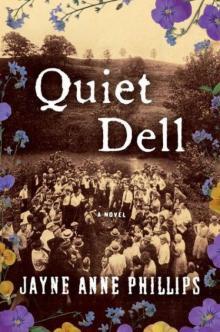 Quiet Dell: A Novel
Quiet Dell: A Novel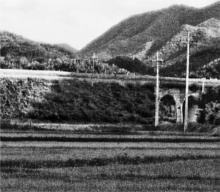 Lark and Termite
Lark and Termite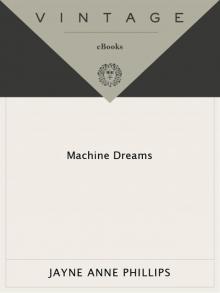 Machine Dreams
Machine Dreams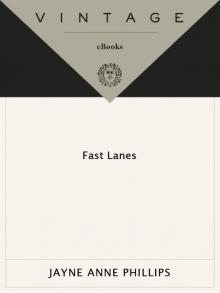 Fast Lanes
Fast Lanes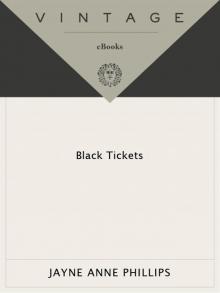 Black Tickets
Black Tickets